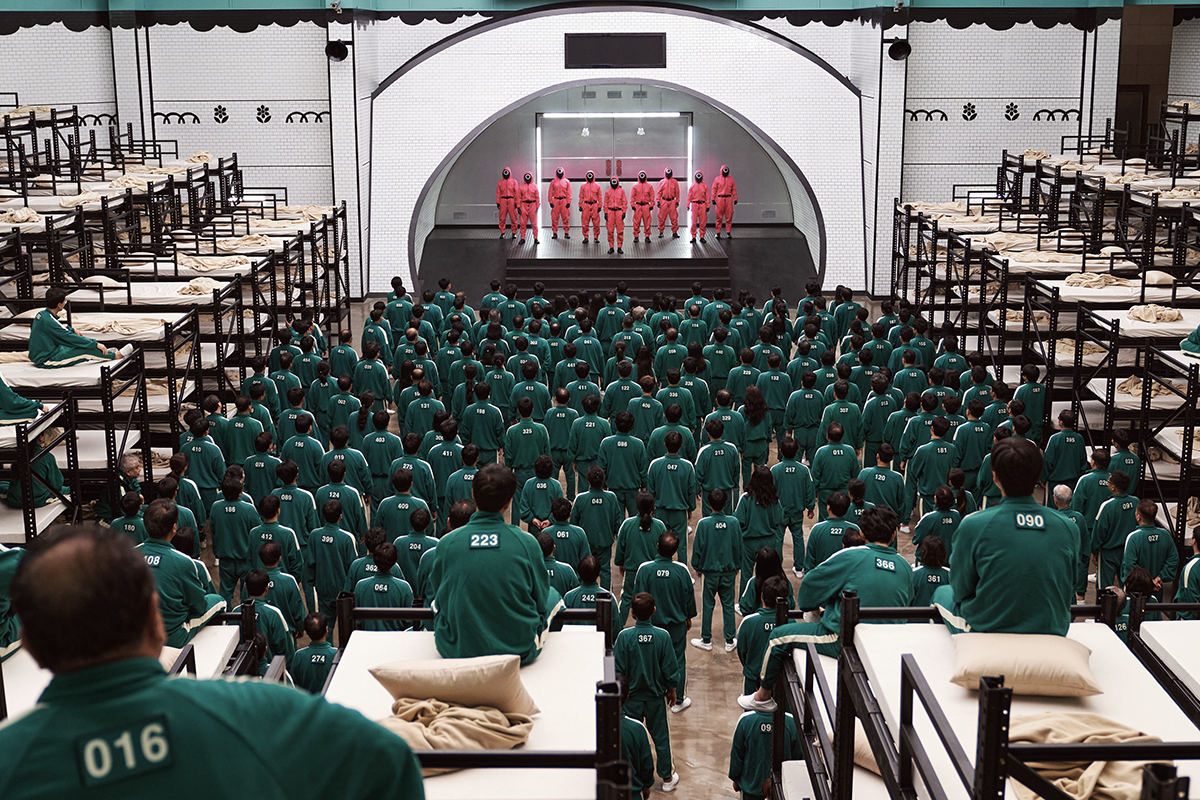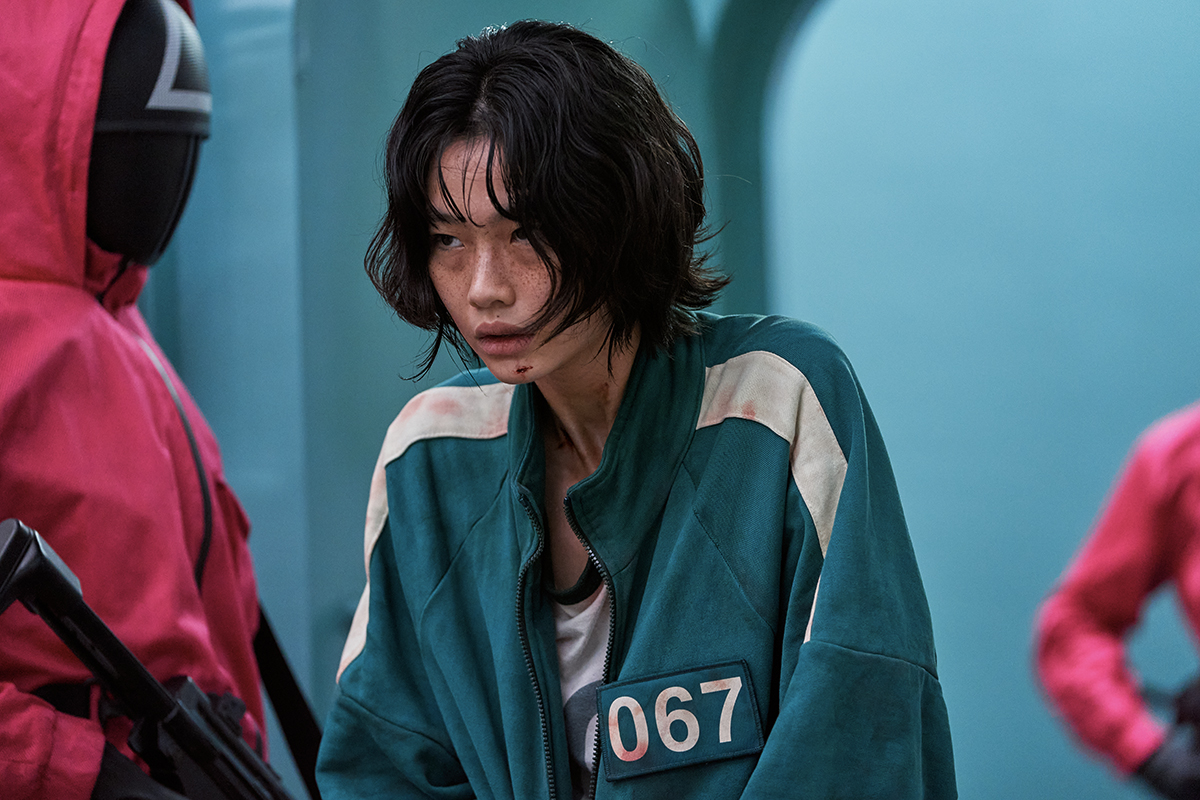Much has been said about the new series Squid Game on Netflix, from the ultra-violence to the incredibly cosplayable costuming, the series lures you in with a provocative concept and soon you’re hooked. But perhaps it’s because I’ve been trained by shows like Westworld and Lost to notice the details, but Squid Game delivered no surprises. The premise gathers together 456 contestants on the edge of financial ruin together for a Hunger-Games-like challenge, the last to make it out gets the prize of ₩45.6 billion, approximately $39 million.
The concept is nothing new but that doesn’t mean there isn’t potential. After all, we live in a world where both Battle Royale and The Hunger Games can exist alongside one another. Each story serves its own purpose. There is absolutely nothing fresh about any of these characters, who are built on the backs of archetypes and tropes without any further development or nuanced execution. The characters are as cookie-cutter as they get. You never once have to question your instinct about a character, and yes, I am including that final twist. The clues were there for you.
And in some ways, that’s a successful part of Squid Game. By the end of the series, I felt pretty validated because I accurately predicted every major character’s fate. But was I satisfied? Not at all. The series deals with the lowest of hanging fruits when it comes to Korean cinema which is wealth inequality. It’s 2021, we’ve all seen Parasite. This is a rehashing with absolutely no new commentary. The evil rich people are as mustache-twirling as you can get. Faceless save for a couple, and most burdened with absolutely horrible dialogue.

The bluntness of the violence is completely meaningless. Who are the people pulling the trigger? How does the winner face life after with their blood money? What does that say about the disparity between the poor and the uber-rich? The series spends too much of its time on the games and the murder-of-it-all. I found myself watching the series at 1.5x speed just to speed up the process, wishing to god there was a 3x speed simply so I could get through the rote scenes.
The problem that comes with Squid Game‘s storytelling is that it is never, ever subtle. It’s overkill to a fault. Significant plot hooks and hints are returned to multiple times, at one point one character explains something in Korean and then it cuts to a scene where someone repeats the exact same information in English. They do know we have subtitles on, right? All of this overexplaining takes away from the mystery and where you would expect a series to slowly evolve beyond just the game, Squid Game never does. It never trusts the viewer to put the pieces together on their own. Only in the last half of the final episode do we actually start exploring some interesting concepts, but then the series is over.
Lee Jung-jae’s performance as Seong Gi-hun is decent, though his character fluctuates so strongly between a grating addict and a sad, divorced dad in the beginning that it makes him immensely trope-ish as a first impression. Lee shine through toward the end, especially in his scenes with Jung Ho-yeon’s Kang Sae-byeok and Oh Yeong-su’s Oh Il-nam. But that’s not enough to save this. The reality is, ironically, there are no stakes when it comes to Gi-hun. I never once feared for his life. A more complex Squid Game might have done a mid-season protagonist switch, pulling a Game of Thrones Season 1 finale move, but the formulaic nature of the series never had me worrying. Will Gi-hun accomplish this impossible task despite sabotage and time working against him? Of course. He’s the main character.

It’s unfortunate because the side characters are as interesting as Gi-hun, if not more. Sae-byeok is an escapee from North Korea trying to get her brother out of an orphanage and bring her family together. Anupam Tripathi’s Ali Abdul is a Pakistani immigrant trying to make a living wage despite a crooked boss and workplace injuries. Hell, even Gi-hun’s childhood best friend Cho Sang-woo (Park Hae-soo), who is the captain of being unsubtle, lives in a sort of moral grey when it comes to his alliance with Ali that makes the scenes dynamic. We never get full episodes from their perspective, nor does the camera ever swing to them with any real commitment. Once we learn their tragedies they become numbers and part of the game.
The least interesting thing about Squid Game is the actual game. Anyone who has watched a season of Survivor can give you an idea of how things will play out. The mystery behind the game is the thing that hooks us in. If we spent two or three episodes in the game before veering off into backstories and investigation, this review would be far kinder. And the series even primes you for learning more about who is behind this all with Wi Ha-joon’s Hwang Jun-ho, a dogged police officer who is out to find the truth. But his story is the least explored and by the end of the series, I’m ready to close the book on the universe from disappointment at the way his character arc played out. I’m not interested in continuing on if it means I need to slog through more filler.

There is nothing innovative or new about the candy-colored violence, basic story, or personality-less direction style of Squid Game. I think people forget that Parasite isn’t just a masterpiece because of the story on the page, but Bong Joon-ho’s vision behind the camera is vital as well. There’s nothing to write home about there. The vision is clear, it just isn’t interesting. Yes, the rich abuse the poor. We already knew this, thank you for painting a very fanciful pastiche of this. Is there something to be said about the symbolism of the fact that the contestants play children’s games that leave their lives on the line instead of just childish pride? Sure, they say it in every episode and then beat you over the head with it to make sure you’ve got it.
Sadly, Squid Game‘s popularity, likely due to a combination of violence, the general look at wealth inequality, and the Western world’s hunger for Korean media, there will probably be more to come, both for Squid Game and its imitators. For those lured in by the low-effort concept or the pastel palette freckled with blood, Squid Game is a shallow story that uses a social issue as a platform for shocking violence. Yawn.
Thank you for the most accurate review I’ve seen so far. I’m going to send my mates this instead of trying explain it myself. I’m mildly tempted to watch the first two episodes again, to see if I should have spotted the end twist earlier than I did, but it’s not really worth it.
This is a stupid ass review
I finally found someone who put to words exactly every issue I had with this series. I’ve also come to the conclusion through many discussions with people who like the show, that they do in fact just like the show, and struggle to find reasons as to why its *good*, which like fair play to them, I also like trashy shows from time to time.
Well, most people around the world get it. You obviously don’t.
This is a C- review.
preach brother, PREACH!
imagine going to see a saw movie, and instead of having the main group trap mixed in with the police investigation, the main trap happens in the first 30 minutes and then the rest of the film is an investigation.
sucks, doesnt it?
this is what you apparently want from squid game.
obviously you just wanted an opinion different from other people. its okay to like popular things.
My meta criticism says this is a C- review.
Boy, you are really missing the point here, and I thought you were a good reviewer.
The reason why this series is hugely successful all around the world is that people can really relate to these characters. Being “trope-ish” was by design, to make viewers think about what they would do when they have to make those difficult moral decisions in the game.
After I read the following, I lost all faith in what you are saying about this series.
“I found myself watching the series at 1.5x speed just to speed up the process, wishing to god there was a 3x speed..” Seriously?
It honestly sounds like you’re missing the point of the series and wanting to hate it because it’s popular for being an actual good show that follows it’s plot and doesn’t leave it every single episode
It’s a damn shame. I tried to club this piece of trash show to death on Rotten Tomatoes, but it just keeps gaining in popularity….sad, very sad. Squid Games is bad for the health of all rationally thinking societies. It threatens to encourage stupidity amidst an ever growing atmosphere of class/economic volatility and equality.
https://www.rottentomatoes.com/user/id/978273003/tvratings
This is the kind of reviewer that would compare a film with a TV show. What. An. Idiot. You cannot compare a film with a television show. They are simply different formats. Just like how you cannot compare Lord of the Rings Trilogy with Game of Thrones simply because it’s not a fair comparison. If I need to explain this even more in detail for a film reviewer, you should quit as a reviewer. You don’t deserve to be one if you cannot distinguish between the two categories. At least you should have made an attempt to compare it with a better choice of Alice in Borderland which is similar to Squid Game and with the same categorization. Parasite??????
Such a great review. It sounds like some of the commenters resent that you’re holding an unintentionally C+ pulp series to a normal TV show standard.